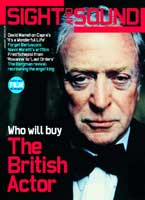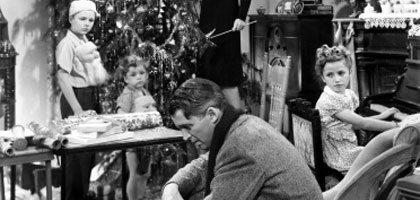
Crisis In Happyland

David Mamet looks at America's unofficial Favourite Film.
In Frank Capra's It's a Wonderful Life (1947) the screenwriters warp an old-world vision into a populist myth. The old-world vision is Charles Dickens' A Christmas Carol (1843), the story of a miser who is given a chance at redemption. In it Scrooge, watching his own death, is treated to scenes of the Cratchit family, happy-though-poor - to scenes of a better life.
It's a Wonderful Life, essentially the same story, features not Scrooge but the paterfamilias Bob Cratchit. Here Cratchit surrogate George Bailey, played by James Stewart, is unhappy though poor. He, like Cratchit, is beloved of his family and community, but 'things go wrong' and a financial shortfall and looming ruin and disgrace make him wish he had never been born. A vision of his own death (a world in which he was never born) wises him up to his many blessings, he decides to live, and all is made well.
But the populist myth cannot cleanse itself completely: George Bailey is a banker. Like Scrooge he handles money. Unlike Scrooge, he takes none for himself - he is a banker-altruist, dedicated to the community. Now, no doubt and thank God, such people may exist. But why do we discover them in a myth? Bailey and Cratchit are both the working poor, dedicated to a life whose rewards are other than material. But only one is a banker.
Bailey tells Old Man Porter (the film's Bad Banker, in effect Scrooge) that he, Bailey, makes loans based on a man's character. This is, of course, the fantasy of anyone who has ever applied for a loan. But who has ever encountered it other than in the movies?
We find it again in an almost identical scene in a very similar movie: William Wyler's The Best Years of Our Lives (1946). In this - another populist American myth - we have a world returned from war. One of the protagonists, Al Stephenson, played by Fredric March, is a banker come back from combat in the South Pacific. He makes a loan to an ex-serviceman based on his, Stephenson's, assessment of the man's character. Stephenson's boss, played by Ray Collins, chastises him and Stephenson replies that in combat one had to learn to read other men's characters and to base one's whole existence on that reading. The boss suggests that though he will let it go this time, that is not the way to run a bank.
In both films it would seem the collective unconscious is asking, 'Why did we fight the War?' And the larger question, the posing of which Martin Dies and the House Un-American Activities Committee attacked conclusively soon after: 'To whom does the land belong?' Both films assert that the land belongs to the People, 'Who do most of the living and dying around here.' To 'the little man'. We see the fantasy of the anti-capitalist banker again in Capra's American Madness (1932), in which the hero, played by Walter Huston, is running, one might say, a counter-cultural bank, making loans based on his own intuition and sense of fair play - happy, beloved by his workers, abominated by the 'bad' forces of capital.
In all these films the collective unconscious, perhaps, is coming to grips with the notion of capital, of accumulation, and positing the possibility of a capitalist power benevolent to the workers - to the little man, the common folk. This, it seems, is as close as Hollywood can get to the notion of an equitable distribution of wealth - the reliance on a person of character in a position usually occupied by the heartless.
A dispossessed farmer asks in Steinbeck's The Grapes of Wrath (1939), 'Isn't there anybody who knows what a shotgun is?' Thorstein Veblen asks the same question in Absentee Ownership: Business Enterprise in Recent Times: The Case of America (1923) and, in both cases, the question is, sadly, rhetorical. For the American ethos of accumulation, agglomeration, merger, all in the name of freedom of the individual (unrestrained capitalism, individual choice, lack of government intervention, and so on), ensures that labour must be oppressed.
Scrooge, rescued from eternity in Hell, does not divide all he has with Cratchit, he brings him a turkey. The films named above praise un-selfinterested capitalism. But such is of necessity an oxymoron. In their praise of individual conscience they indulge in a peculiarly Conservative ethos: Enlightened (or Compassionate) Conservatism. Such may, indeed does, pass muster as wish-fulfilling entertainment, but as political aim it can be adopted only by the self-deluded. For if the worker has no power to demand (other than as an appeal to conscience), he or she has nothing. George Bailey can't afford to take a vacation, Bob Cratchit gets a turkey. The first farmer in the door after the war gets a loan from Stephenson, but the second is informed that Mr Stephenson is no longer with us.
The memories of World War II and of the Depression waned. America voted for Ronald Reagan, whose administration, in the fulfilment of a Conservative erotic dream, broke the back of labour. The voter was induced to vote for a fantasy: every man a millionaire; no more government intervention. But government intervention, of course, persisted and persists and must persist, for that is the essence of government. The Conservatives, during their sway, merely had it intervene for them. And it was in those Reagan years that It's a Wonderful Life replaced Casablanca (1942) as the unofficial Favourite Film of America - the fantasy of the Compassionate Conservative.
An allied film, the precursor to It's a Wonderful Life, is Irving Pichel's Happy Land (1943), in which the town druggist (Don Ameche) loses a son in the war but discovers - through the intervention of a medium, the ghost of his grandfather (Harry Carey) - that life is still worth living. What wonderful persistence and reiteration of forms do we find in our collective unconscious. Vide: much the same scene - 'what would have been' - in these small-town dramas. And let me name one more: Our Town. In Thornton Wilder's 1938 play Emily dies and is permitted to look back at the life she lived, and she weeps that she did not know how precious even the least and most mundane of it was.
The drugstore plays a pivotal role - in Our Town it's where George proposes to Emily; in It's a Wonderful Life it's where the young George Bailey intervenes with his employer, a drunken druggist, to correct a fatally mismade prescription; in Happy Land it's where the hero is himself a druggist. (In both Happy Land and It's a Wonderful Life the druggist is destroyed as he learns of the death of his son.) In these films and, as I remember, in the American films of the 50s from my youth, the drugstore was the locus of popular wisdom. Like the character of George Bailey, it bridged the gap between the hierarchical (in this case the medical establishment) and the populist ('anecdotal' information, folk remedy, or, if I may, compassion).
Is it stretching the conceit to suggest that these myths feature the pharmaceutical rather than the medical - that their heroes do not (mythologically) contend with life and death, but merely with analgesia? For the films' financial myths deal with analgesia rather than revolution - with the personal (anecdotal) 'There exists a kindly banker' rather than with the societal 'Capitalism so conduces to excess that strong opponent forces must exist.'
One sees the post-war myth of It's a Wonderful Life and smiles warily at the notion that all one needs is a kindly banker. One sees the visions of Italian neorealist Vittorio De Sica (Bicycle Thieves/Ladri di biciclette, 1948; The Roof/Il tetto, 1956) and perhaps wonders what one can do to strengthen one's Union. In De Sica's films the poor are not the 'other', as they are in It's a Wonderful Life; they are people like ourselves, but without money.
Bob Cratchit is happy without money and it seems that George Bailey is happy without money, but the punchline of the film (disregarding the short epilogue, in which 'an angel gets his wings') is George's brother's toast. Upon the restoration of order, George is saved, by the intervention of a rich friend. He is apprised of the community's love for him and his brother Harry toasts him: 'To my brother George, the Richest Man in town.' We are, of course, to understand the toast as metaphor, but we should perhaps note our unremarked acceptance of the metaphor of happiness as wealth.
